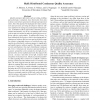Free Online Productivity Tools
i2Speak
i2Symbol
i2OCR
iTex2Img
iWeb2Print
iWeb2Shot
i2Type
iPdf2Split
iPdf2Merge
i2Bopomofo
i2Arabic
i2Style
i2Image
i2PDF
iLatex2Rtf
Sci2ools
135
click to vote
ICSE
2004
IEEE-ACM
2004
IEEE-ACM
Skoll: Distributed Continuous Quality Assurance
Quality assurance (QA) tasks, such as testing, profiling, and performance evaluation, have historically been done in-house on developer-generated workloads and regression suites. Since this approach is inadequate for many systems, tools and processes are being developed to improve software quality by increasing user participation in the QA process. A limitation of these approaches is that they focus on isolated mechanisms, not on the coordination and control policies and tools needed to make the global QA process efficient, effective, and scalable. To address these issues, we have initiated the Skoll project, which is developing and validating novel software QA processes and tools that leverage the extensive computing resources of worldwide user communities in a distributed, continuous manner to significantly and rapidly improve software quality. This paper provides several contributions to the study of distributed continuous QA. First, it illustrates the structure and functionality o...
Around-the-clock Qa Process | Continuous Qa Processes | Global Qa Process | ICSE 2004 | Software Engineering |
Related Content
| Added | 09 Dec 2009 |
| Updated | 09 Dec 2009 |
| Type | Conference |
| Year | 2004 |
| Where | ICSE |
| Authors | Atif M. Memon, Adam A. Porter, Cemal Yilmaz, Adithya Nagarajan, Douglas C. Schmidt, Balachandran Natarajan |
Comments (0)

